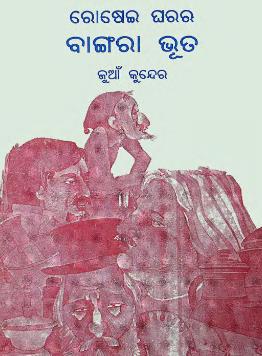Rosei Gharar Bangara Bhuta captivating storybook penned by Juan Kunder and masterfully translated into Odia by Birabar Naik, has emerged as a delightful addition to contemporary Odia literature. This enchanting tale invites readers into a world where the supernatural intertwines with everyday life, emphasizing themes of hope, courage, and the enduring bond of family.
At the heart of Rosei Gharar Bangara Bhut lies a mesmerizing narrative that revolves around a curious and adventurous child who discovers the mysterious “Bangara Bhut” (Golden Ghost) residing in an old, abandoned house. The protagonist embarks on a journey of exploration, driven by an insatiable curiosity and the allure of the ghost’s legend. As the child encounters this splendid entity, the lines between reality and fantasy blur, leading to a series of enchanting adventures filled with challenges and lessons.
The ghost, unlike typical representations of the supernatural, embodies qualities of wisdom and kindness. Through its interactions with the child, the story conveys meaningful messages about confronting fears and understanding the past. The setting is richly described, with the old house becoming a character in its own right, steeped in history and mystery.
One of the central themes of the book is courage—the courage to face the unknown and confront one’s fears. The child’s journey serves as a metaphor for growing up, navigating through the challenges of childhood, and discovering one’s identity. The transformation experienced by the protagonist mirrors the universal journey of every child, making the story relatable to readers of all ages.
Moreover, the narrative beautifully illustrates the importance of family and friendship. The child’s interactions with loved ones highlight the support system that aids in overcoming obstacles. The bond shared with family becomes a source of strength, illustrating that love and connection can illuminate even the darkest paths.
Juan Kunder’s storytelling, enriched by Birabar Naik’s translation, celebrates the cultural heritage of Odisha while introducing universal themes that transcend geographical boundaries. The blend of local folklore with a modern narrative enhances the book’s appeal, allowing readers to appreciate the richness of Odia culture through engaging storytelling.
Additionally, the lush descriptions of the rural landscape and traditional customs provide a vivid backdrop, immersing the reader in the essence of Odisha. This cultural immersion fosters a connection to the land and its people, encouraging readers to cherish their own roots.
Kunder’s writing style is characterized by vivid imagery and lyrical prose, drawing the reader into a fantastical world. The translation by Birabar Naik maintains the original’s charm while ensuring that the nuances of the Odia language resonate deeply with local readers. The book has been well-received by both children and adults, celebrated for its ability to entertain while imparting valuable life lessons.
In conclusion, Rosei Gharar Bangara Bhut by Juan Kunder, translated by Birabar Naik, is more than just a children’s story; it is a heartwarming tale that explores the depths of childhood wonder, courage, and the significance of familial bonds. With its enchanting narrative and rich cultural backdrop, this book is destined to leave a lasting impression on its readers, encouraging them to embrace curiosity and cherish the connections that shape their lives.
Books Info
| Books name | Rosei Gharar Bangara Bhut |
| Translator | Juan Kunder; Birabar Naik, . |
| No Of pages | 20 |
| Publisher | NA |
| Publication | NA |
| Printed At | NA |
| Distributor | NA |

